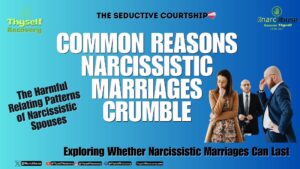The Rocky Prospects: Exploring Whether Narcissistic Marriages Can Last
The Narcissist’s Initial Idealization While Courting a Future Spouse
During courtship, narcissists often pursue and charm prospective partners aggressively through behaviors like:
Love Bombing
Excessive flattery, gifts, texts, and compliments make the target feel extraordinarily special.
Mirroring
The narcissist will imitate the target’s interests, values, and dreams to establish false compatibility.
Future Faking
The narcissist makes amazing promises about their future together like marriage, kids, etc. that hook the target.
Idealization
The narcissist will portray their new relationship in unrealistic, fairytale terms.
The Motivations Underlying the Narcissist’s Marriage Pursuit
Despite relating limitations, narcissists seek marriage for reasons like:
Ongoing Admiration
A spouse provides a dedicated audience catering endlessly to the narcissist’s ego.
Prestige
Having an impressive partner enhances the narcissist’s status and self-image.
Normalcy
Marriage helps the narcissist maintain a façade of a happy, successful life.
Compliant Supply
A spouse secures the narcissist’s primary source of emotional, sexual, domestic supply and services.
Power
The narcissist enjoys dominating, controlling, and manipulating their marital partner.
The Narcissistic Spouse’s Relating Patterns
Once married, the narcissist relates through chronic behaviors like:
Criticism
They criticize their spouse constantly to keep them insecure and easier to control.
Superiority
They convey superiority and remind the spouse of their inadequacy frequently.
Manipulation
They employ manipulation tactics like gaslighting, triangulation, threats, guilt trips etc.
Exploitation
They exploit their spouse’s time, empathy, sexuality, finances etc. without reciprocation.
Control
They micromanage their spouse’s life, whereabouts, and relationships to maintain domination.
Impacts on the Non-Narcissistic Spouse
The non-narcissistic spouse often suffers from:
Plummeting Self-Esteem
The narcissist’s criticisms often lead to cripplingly low self-worth.
Loss of Identity
Trying to appease the narcissist causes partners to lose touch with their own needs and sense of self.
Depression
The chronic stress, loneliness and trauma of the narcissistic relationship may lead to depression.
Anxiety
Walking on eggshells around the narcissist’s moods causes severe anxiety in partners.
PTSD
The narcissist’s crazymaking behavior, rages, and abuse can lead to their partner developing complex PTSD.
Why Narcissistic Marriages Fall Apart
There are several factors that lead to the dissolution of marriages with narcissistic spouses:
Affairs
Narcissists often cheat due to boredom, ego-gratification needs, and lack of empathy.
Discarding
Eventually narcissists discard partners who no longer adequately meet their needs.
Narcissistic Rage
Their spouse can only tolerate being subjected to extreme fits of anger for so long before reaching a breaking point.
The Spouse’s Personal Growth
As victims recover self-esteem and get support, they become empowered to leave.
Outside Interference
If others witness abuse, they may intervene, convincing the spouse to leave.

Separating Safely From a Narcissist
Victims must plan carefully before attempting to end a narcissistic marriage, given risks like:
Retaliation
The narcissist may try to punish them via threats, harassment, violence or legal/custody abuse.
Hoovering
The narcissist will flood them with pleas, faux apologies, or threats of self-harm to get them to return.
Smear Campaigns
The narcissist may do a smear campaign attacking their reputation to gain support for themselves.
Financial Abuse
The narcissist may sabotage their finances and ability to leave.
Healing After Breaking Free
After leaving the marriage, the victim can heal by:
Cutting Contact
They must block the narcissist on all channels to prevent further abuse.
Seeking Validation
Connecting with empathetic friends, family, and support groups validates their experiences.
Pursuing Therapy
Counseling helps them process trauma and regain their sense of worth.
Enjoying Freedom
They get to rediscover who they are and do activities they enjoy away from the narcissist’s constraints.
Loving Themselves
They learn to be their own best support system and show themselves the care the narcissist denied them.
In summary, while narcissists pursue marriage aggressively, their relating patterns are toxic. Their spouses suffer greatly, and without treatment, narcissistic marriages often end. But victims can heal and thrive after breaking free.
